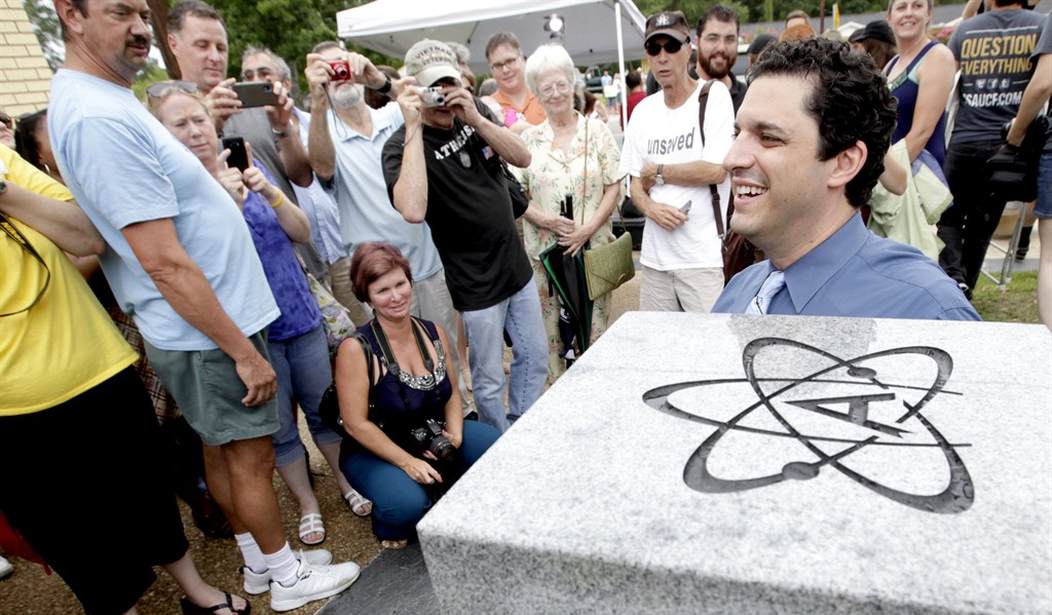Father’s Day, that wonderful occasion when we celebrate our dads, is a time when all of us who have terrific dads need to feel sorry for atheists. It’s not such a happy day for them. That’s the take-away from a book called Faith of the Fatherless: the Psychology of Atheism by psychology professor Paul Vitz who examines the lives of militant atheists and concludes that at the heart of their disbelief lies a disappointing and sometimes abusive experience with the atheist’s earthly dad. Having felt no love from their own dads, they just can’t believe in a God the Father who loves them.
Vitz, a Professor Emeritus of Psychology at New York University who earned his Ph.D. at Stanford, is intellectually equipped to meet Sigmund Freud, psychology’s Big Daddy, on his own turf. Freud is the original God-scoffer who invented the catechism that all other God-scoffers have faithfully parroted up to the modern era of God-scoffers: “Religion is a system of wishful illusions together with a disavowal of reality, such as we find nowhere else but in a state of blissful hallucinatory confusion.” Freud’s theory over the years has evolved into the writing and ranting of today’s popular God debunkers who habitually brand religious believers as fools, ignoramuses, and Neanderthals with a childish need for security in the sky in the form of an Almighty Whatever.
But protesting so much sounds less academic than it does, well, personal. And so it is with Siggy: so personal that Freud’s troubles with his father started in childhood when he told his son he would amount to nothing, and the boy recalled that “I used to run as if I wanted to get off from my father, when I was scarcely able to walk.” Freud’s negative feelings toward his father at the same time he was his loving mother’s favorite child likely informed his discovery of the psychoanalytical development stage he called the Oedipus Complex, named for the mythical Greek prince who unwittingly killed his father and then married his mother.
Vitz, who was himself an atheist until his late 30’s when he became a Catholic, examines the lives of over two dozen other famously influential and often belligerent nihilists and atheists from the 18th Century to the present, like Jean-Paul Sartre, Bertrand Russell, David Hume, Albert Camus, Voltaire, and Mr. God Is Dead himself, Friedrich Nietzsche. He finds that these “fathers” of the atheist movement, cheerleaders for Freud’s theory that belief is just wishful thinking, all had absent or bad dads.
Recommended
The evidence suggests that rather than being based on any superior rationality or intellect as they would have us believe, militant atheists’ objection to and even hatred of the very idea of God may be largely rooted in their childhood psychology and dad-deprivation. Thus, they are prisoners of their own irrational personal psychology, the same weakness of which they accuse the religious believer.
For example, many of the big-time atheists had no father in their lives at all. Sartre’s father died when he was only one, as did Camus’ dad. Hume’s father passed away when he was two, and Russell, one of the really notorious atheists of all time, lost his father when he was four. H.G. Wells, Josef Stalin, Freud himself, and others all had very difficult and troubling relationships with their fathers.
Intriguingly, the book also covers the lives of a similar number of prominent God believers from the same eras, including Soren Kierkegaard, Blaise Pascal, Edmund Burke, G.K. Chesterton, and anti-Nazi martyr and pastor Dietrich Bonhoeffer. These biographical sketches reveal that while the atheists had weak, mean, or absent fathers, the theists had strong relationships with good fathers or father substitutes.
Of course, the world of atheist bloggers and writers immediately expressed their collective angina attacks over Vitz’ book, insisting they all had perfect and totally angelic fathers. But Vitz is not saying that every single atheist out there is a result of a problem with pater. Yet there’s lots of fascinating evidence in the biographical sketches he presents that a relationship with dad is a strong influencer. And how could it not be?
This book can serve as a warning to parents: if you want your children to have a strong, secure faith, make sure that they have a strong, secure relationship with a loving father. Pew research also shows that the single most determining factor in a child retaining religious faith in adulthood is whether the father has an active faith.
So while you’re celebrating Dad this weekend, find an atheist and give him or her a big hug – they need it.

























Join the conversation as a VIP Member